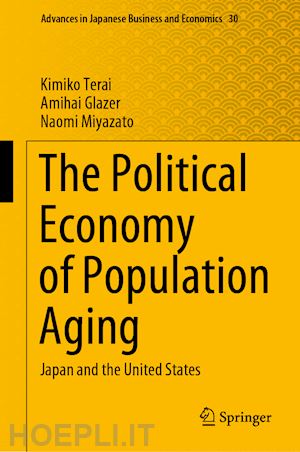
Questo prodotto usufruisce delle SPEDIZIONI GRATIS
selezionando l'opzione Corriere Veloce in fase di ordine.
Pagabile anche con Carta della cultura giovani e del merito, 18App Bonus Cultura e Carta del Docente
This book integrates the economics of aging and insight based on political economy and explores generational conflict in the context of governmental spending. This problem is general, as the Covid-19 pandemic has highlighted: lockdowns protect the elderly, but hurt the young. Policies to address global warming impose taxes on the elderly, but would bring benefits largely in the future. This book addresses intergenerational problems by placing its focus on budget allocation, taxation, and regulation. By using Japanese and US data, the authors conduct statistical analysis of whether regions with aging populations may adopt policies that generate benefits during a short period of time instead of policies that could benefit current young generations for an extended period of time. If the policy preferences of voters depend on their age, and if policy adoption by a government reflects public opinion, the change in demographic composition in a region may affect governmental policies. In an aged society, the elderly are pivotal voters. Budgets may be reallocated from policies favored by younger generations, such as education, to policies the elderly prefer, such as welfare programs. This generates an intergenerational externality problem: voters with short life expectancy do not take into consideration long-term benefits. Moreover, the current tax bases may be replaced by other tax bases that do not harm the elderly. The results reported in the book largely support these hypotheses. Evidence also shows that the gender and racial composition and institutional factors, including the extent of fiscal decentralization, are important in anticipating effects of population aging in other countries.
Population Aging and Political Economy.- Expenditure on Public Investment.- Expenditure on Education.- Expenditure on welfare.- Interregional Tax Competition.- Comparison of Japan and the US.- Concluding Remarks.
Kimiko Terai is a professor in the Faculty of Economics, Keio University, Tokyo, Japan. She finished her Ph. D. in economics at The University of Tokyo in 2003 and taught at Hosei University (2002–2012) before assuming her current position in 2012. She has held visiting researcher positions at the National Institute of Population and Social Security Research, Tokyo (1998–1999) and the University of California, Irvine (2007–2009). Her principal research areas include public economics, political economy, and public finance, with a special focus on the political economy of redistributive policies. She has published her work in academic journals that include Social Choice and Welfare, Journal of Public Economic Theory, Economics and Politics, Economics of Governance, and International Tax and Public Finance. She published The Political Economy of Fiscal Consolidation in Japan (co-edited with Toshihiro Ihori) in 2015.
AmihaiGlazer is a research professor in the Department of Economics at the University of California, Irvine, California, U.S.A. He finished his Ph.D. in economics at Yale University in 1978 and began teaching at the University of California, Irvine, in 1979. He held visiting professor/researcher positions at Carnegie Mellon University (1991–1992) and Stanford University (1985). He is co-editor of Economics of Governance (from 1997), and is on the editorial board of Public Choice (from 1997). His principal research areas include political economy, public choice, and microeconomics. He has published many papers in academic journals including American Economic Review, Economic Journal, European Economic Review, Public Choice, Journal of Public Economics, Journal of Urban Economics, American Political Science Review, and American Journal of Political Science. He has also published and edited books, including Price Theory and Applications (1992), Why Government Succeeds and Why It Fails (2001), Conflict and Governance (2003), and Direct Democracy's Impact on American Political Institutions (2008). These volumes have been translated into Spanish, Japanese, Hungarian, French, and Chinese.
Naomi Miyazato is a professor in the Department of Economics at Nihon University, Japan. His first academic position was as a researcher at the National Institute of Population and Social Security in Japan. He was a lecturer from 2005, an associate professor from 2008, and a professor from 2014 at Nihon University. He received a B.A. in economics from Ryukyu University, Japan, in 1995; an M.A. in economics from The University of Tokyo in 1997; and a Ph. D. in economics from The University of Tokyo in 2015. He was previously a visiting researcher at the University of California, Irvine, and the University of Pennsylvania, The Wharton School, and a research fellow, the Board ofAudit of Japan. His research fields are public finance, social security, and health economics. His research focuses on intergenerational distribution, public pension, and aging; he has studied these topics based on simulation and empirical analyses. His work has been published in Japan and the World Economy and the Japanese Economic Review.











Il sito utilizza cookie ed altri strumenti di tracciamento che raccolgono informazioni dal dispositivo dell’utente. Oltre ai cookie tecnici ed analitici aggregati, strettamente necessari per il funzionamento di questo sito web, previo consenso dell’utente possono essere installati cookie di profilazione e marketing e cookie dei social media. Cliccando su “Accetto tutti i cookie” saranno attivate tutte le categorie di cookie. Per accettare solo deterninate categorie di cookie, cliccare invece su “Impostazioni cookie”. Chiudendo il banner o continuando a navigare saranno installati solo cookie tecnici. Per maggiori dettagli, consultare la Cookie Policy.